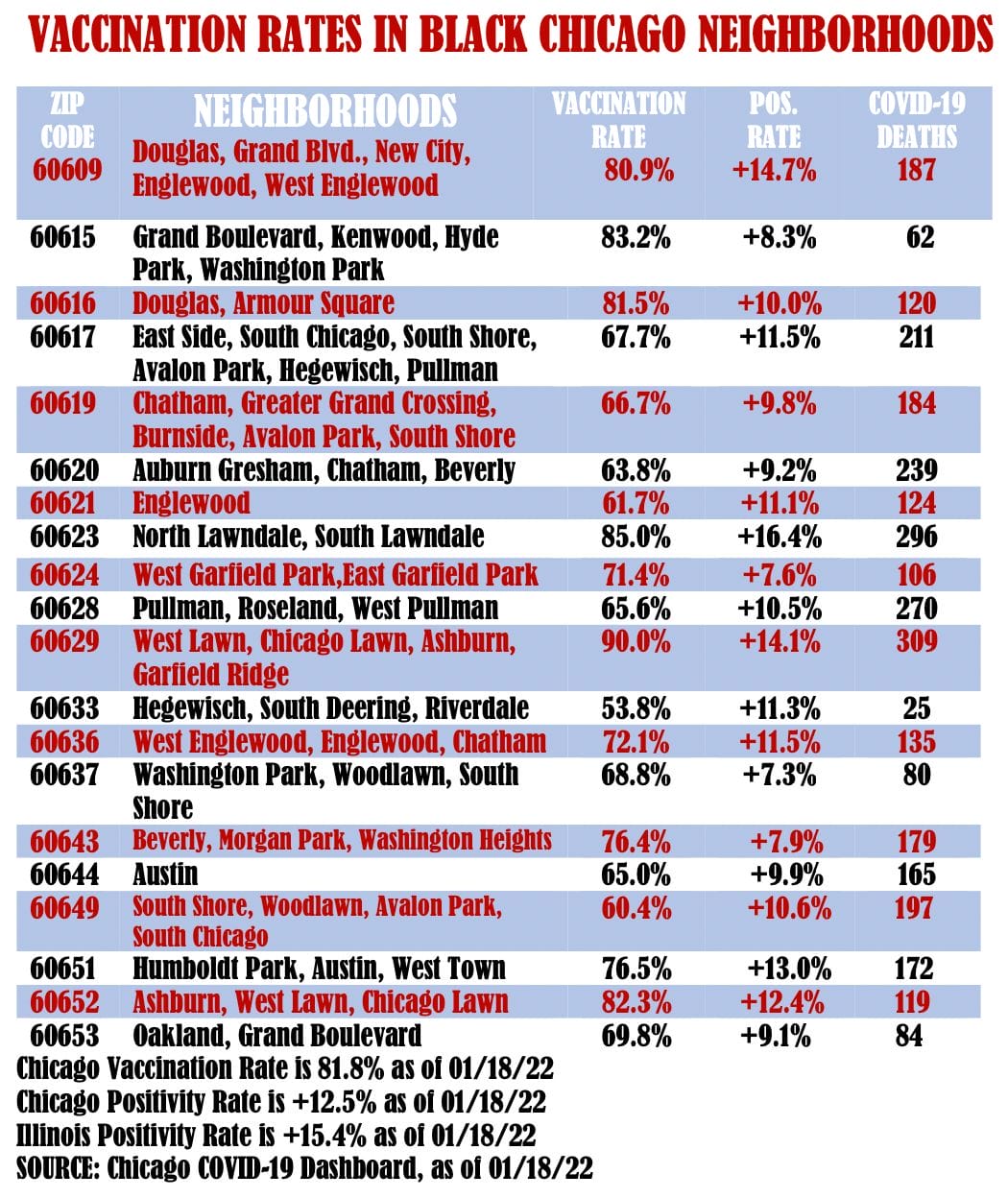After a deadly COVID-19 surge that killed hundreds during the holiday season, the positivity rate in most of Chicago’s Black neighborhoods is plummeting below the city average, according to a Crusader analysis of data from the city’s COVID-19 dashboard.
The city’s overall positivity rate continues to drop as residents self-quarantine and restaurants comply with Chicago’s new proof of vaccination mandate, which went into effect on January 3.
Last week, the city began distributing 1.5 million free KN95 masks that the Centers for Disease Control and Prevention recommended as more effective in controlling the spread of the fast-moving Omicron variant. Residents can obtain the free KN95 masks from their alderman.
As of Tuesday, January 18, Chicago’s positivity rate was 12.5 percent. But the positivity rate was even lower in 17 out of 20 Black zip codes in Chicago, public health data shows.
Approximately eight Black populated zip codes had positivity rates in the single digits. Zip code 60637, which includes Washington Park, Woodlawn and parts of South Shore, had a positivity rate of 7.3 percent, the lowest among Black zip codes.
Zip codes 60609 (Bronzeville), 60623 (North and South Lawndale), and 60651 (Humboldt Park, Austin and West Town) still had positivity rates higher than the city’s 12.5 percent as of January 18.
But the positivity rates in those and most Black zip codes were much higher two weeks ago. That is when the positivity rate was soaring in the 20s in most Black zip codes. In Austin (60644), the positivity rate was as high as 35.1 percent, and Humboldt Park (60651) had a positivity rate of 30.8 percent.
The surge is also slowing down in New York City, which again became the nation’s epicenter of COVID-19 cases, driven by the Omicron variant.
The COVID-19 death toll in Chicago’s Black neighborhoods continues to climb. Last week, approximately 68 people in Black neighborhoods died from COVID-19. At least one death has occurred in 19 of 20 Black zip codes last week, and seven had at least four deaths. Zip codes 60628 (Roseland, Pullman and West Pullman) and 60619 (Chatham, Greater Grand Crossing, Avalon Park and South Shore) both lost eight residents to COVID-19.
On Wednesday, January 19, many residents began ordering free COVID-19 test kits from the U.S. government’s website, covidtests.gov. Each household will receive four COVID-19 test kits.
Early Wednesday, President Joe Biden’s administration announced plans to distribute 400 million free N95 masks for adults at thousands of pharmacies and other locations where many Americans were vaccinated.
A White House official said the distribution of the masks is the largest deployment of personal protective equipment in U.S. history. The N95 masks will come from the government’s Strategic National Stockpile.
The Washington Post reported that U.S. officials will begin shipping the masks later this week. There will be three masks available per adult. Also, “we anticipate making additional, high-quality masks for children available in the near future,” the official said.
N95 and KN95s are known as respirators that filter out most virus particles — and come with markings to indicate they are authentic. Both types of masks must form a seal to the face to work properly.
While ordinary cloth masks prevent 30 to 60 percent of particles from potentially infecting the person, Dr. Nathan Shively, an infectious disease specialist with Allegheny Health Network, said N95 and KN95 masks prevent 95 percent-plus particles from getting in.
Compared to a cloth mask, which may only have one layer, N95 and KN95 masks have three layers of fabric: an outer layer of non-absorbent fabric such as polyester, a middle layer of a non-absorbent material such as polypropylene, and an inner layer of an absorbent material such as cotton. Medical experts say both masks give at least 25 hours of protection in public settings indoors, compared to 30 minutes for ordinary cloth masks.
President Biden announced last week that the administration would make high-quality masks available and free to all Americans.






